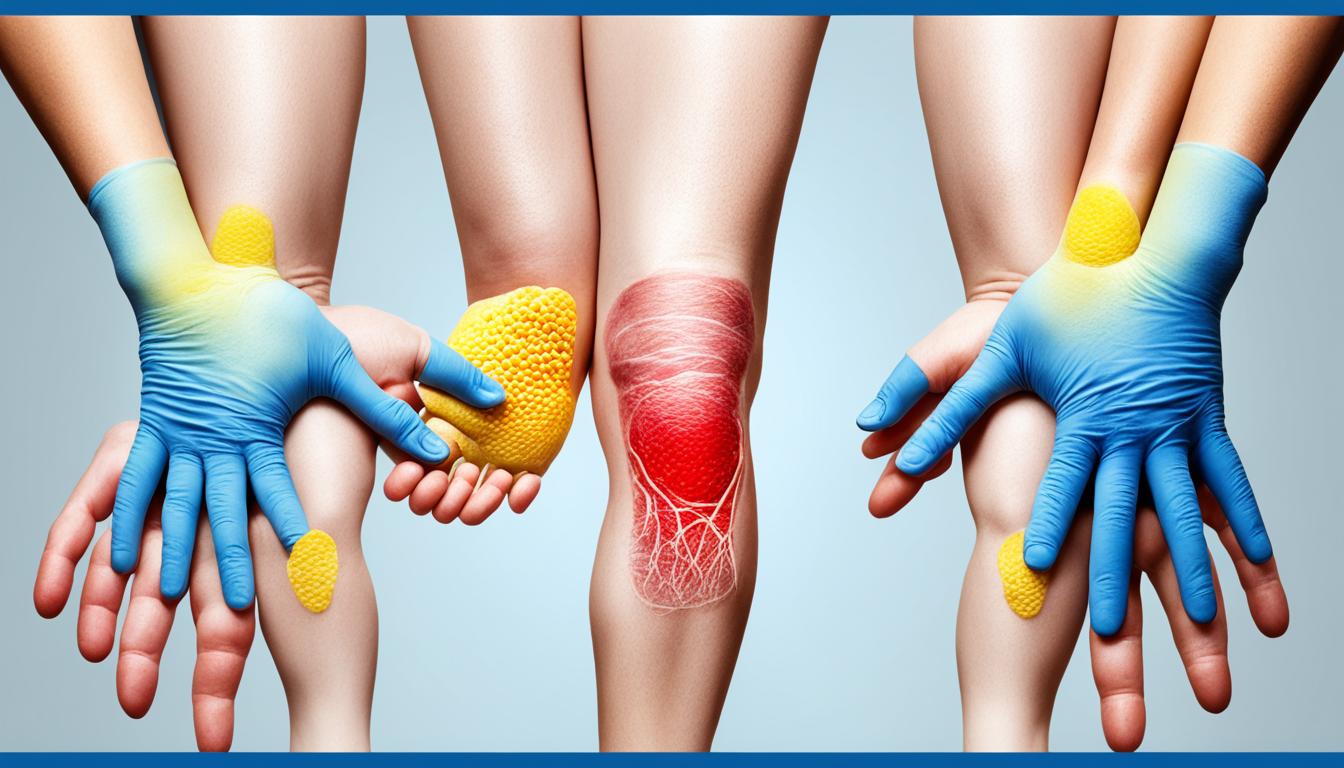Edema is the term for swelling due to fluid build-up in body tissues. It often shows as swelling in the feet, ankles, legs, or face. Many things can cause edema, such as health problems, cancer, and even injuries.
To diagnose edema, doctors use physical exams and tests like blood tests and MRIs. They work to find the cause and how severe it is. Treatment for edema can include things like rest and physical therapy. But now, stem cell therapy is being looked at as a new treatment to help reduce swelling.
Key Takeaways:
- Edema is a condition characterized by fluid retention and swelling in various parts of the body.
- The causes of edema can range from underlying health conditions to certain cancers and injuries.
- Diagnosis of edema involves physical examinations, blood tests, MRI, and ultrasound.
- Treatment options for edema include rest, NSAIDs, physical therapy, surgery, and potentially stem cell therapy.
- Stem cell therapy holds promise for managing edema by promoting tissue regeneration and reducing inflammation.
Causes and Prevention of Edema
Edema is when the body holds on to extra fluid, causing swelling. This can happen for many reasons. Knowing these reasons and taking steps to prevent it can help control edema.
Underlying Health Conditions
Health issues like heart, kidney, or liver problems can lead to edema. They mess up the body’s balance of fluids, causing the tissues to swell. Sometimes, hormonal changes or medicines can also lead to edema.
Lifestyle Factors
Your lifestyle can play a big part in edema. If you sit or stand a lot without moving much, you might develop it. Eating too much salt can make the body keep more water. Being overweight means more pressure on your legs, which can cause swelling.
Prevention and Remedies
- Wear loose-fitting clothes and shoes to keep blood flowing well.
- Keep your feet up when you’re sitting or lying down to make swelling go down.
- Don’t cross your legs, as it can slow down blood flow.
- Regular exercise helps your blood move better.
- Try to eat less salt to avoid holding onto water.
- Follow your doctor’s advice on medicines.
- Ask your doctor about wearing special gear that helps blood flow.
Preventing edema also involves having a healthy diet and being active. Eat plenty of fruits, veggies, and whole grains. Maintain a good weight and don’t drink too much alcohol. These things can lower your chances of getting edema.
Knowing why edema happens and doing things to prevent it can make a big difference. It can help people control the problem and feel better.
Managing Edema and Outlook
How we deal with edema depends on what’s causing it. Besides taking it easy and using NSAIDs for relief, treating the root cause is key. If your heart or kidneys are involved, you might need special meds. Doing things like working out, eating less salt, and keeping your weight down also helps big time.
To beat edema, a full-spectrum plan is best. This means chasing symptoms and causes to stop worse problems. Stick close to your healthcare team for a plan that’s all your own.
The future for someone with edema can look bright. With the right care, life changes, and medical help, you can keep edema in check. Act to prevent it, and you can stay healthy and feel good.
FAQ
Q: What are the common signs of edema?
A: Edema shows up as swelling in different parts of the body. This includes the feet, ankles, legs, hands, and face. Sometimes the abdomen also swells.
Q: What can cause edema?
A: There are many causes of edema. These include health conditions, some cancers, and infections. Also, injuries and chemotherapy can lead to edema.
Q: How is edema diagnosed?
A: Doctors diagnose edema through physical exams and tests. Blood tests, MRIs, and ultrasounds help them confirm it.
Q: What are the treatment options for edema?
A: Rest and over-the-counter NSAIDs are common treatments. Physical therapy and sometimes surgery can be needed. Stem cell therapy is a new option being explored.
Q: What are the causes of edema?
A: Many health issues can lead to edema. This includes heart, kidney, or liver problems. Hormonal changes, certain drugs, pregnancy, and your lifestyle can also cause it.
Q: How can I prevent or manage edema?
A: To prevent or manage edema, try these tips:
- Wear loose clothes and shoes.
- Elevate your feet often.
- Don’t cross your legs.
- Exercise is key.
- Cut back on salty foods.
- Always take medication as your doctor says.
- Talk to your doctor about support stockings or sleeves.
Q: What are the management options for edema?
A: The treatment for edema depends on its cause. Apart from rest and NSAIDs, treating the root issue is vital. Lifestyle changes, like exercising and eating less salt, are also important.
Q: What is the outlook for edema?
A: Edema’s outcome varies by person and its cause. With the right care and lifestyle improvements, managing edema is very doable. This can significantly boost both health and quality of life.

